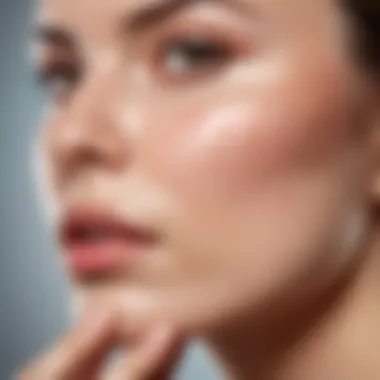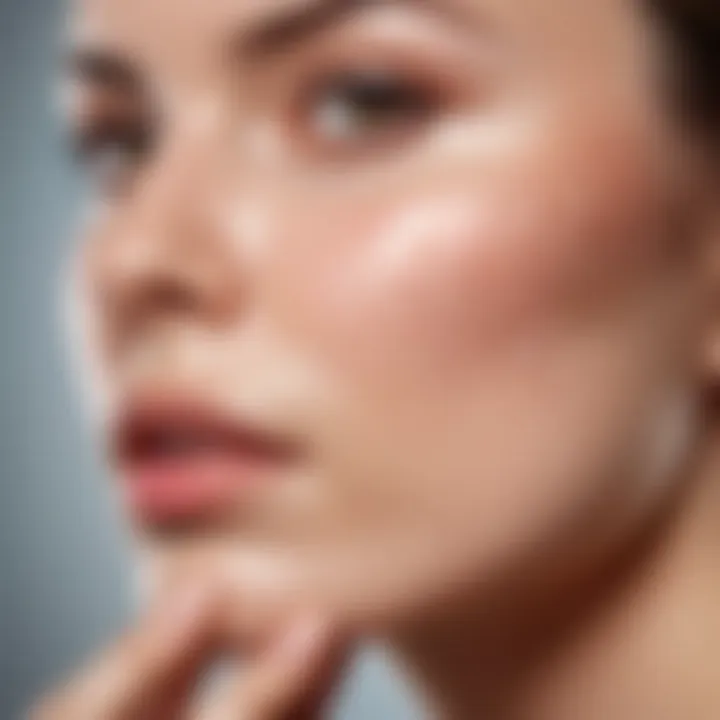Home Remedies for Effective Acne Treatment


Intro
In the quest for clear skin, the journey often leads to a multitude of products with catchy slogans and flashy packaging. Yet, the real solution might just be sitting quietly in your kitchen or garden. Rather than relying solely on commercial products, exploring effective home remedies can provide a refreshing alternative for many. Not only are these remedies generally more affordable, but they often utilize natural ingredients that have been trusted for generations.
Acne can be a troublesome skin condition that affects individuals of all ages, from teens battling hormonal changes to adults facing stress-induced breakouts. Understanding the causes of acne, such as excess oil production, clogged pores, and bacteria, is crucial in finding the right approach for treatment. The ingredients that can soothe inflammation or combat bacteria are often natural, easily accessible, and may even be more effective than some over-the-counter solutions.
The Relevance of Home Remedies
The resurgence of interest in natural skincare is more than just a trend. With a growing awareness of the harmful effects of certain chemicals found in commercial products, many people are looking for safer, gentler options. Home remedies offer a way for individuals to take control of their skincare routines without overwhelming frustration with complex formulations. By understanding the methods and ingredients available, both men and women can enhance their skincare while addressing acne issues holistically.
Developing a clear plan with home remedies requires knowing which ingredients work best for each skin type and learning how to use them effectively. In the following sections, we will explore some powerful natural ingredients, application techniques, and additional tips that can help prevent breakouts, transforming the way individuals approach their skin health.
"Natural ingredients can be the unsung heroes in the battle against acne, delivering results without the side effects often associated with harsher treatments."
As we move forward, let's dive deeper into specific home remedies tailored to combat acne, the mechanics behind these remedies, and practical tips for integrating them into daily routines.
Understanding Acne
Acne is more than just a skin condition; it reflects underlying biological processes. Understanding acne is vital for anyone dealing with it, as it sets the stage for more effective treatment strategies—especially home remedies. With a clear picture of what causes acne and the forms it takes, individuals can tailor their approaches to both treat and prevent this commonly bothersome skin issue.
What Causes Acne?
Acne emerges from a tangle of factors, each playing a role in creating this multifaceted issue. At its core, acne is fostered by the following:
- Hormonal Changes: These are often seen during puberty or menstrual cycles, leading to increased oil production that clogs pores.
- Excess Oil Production: Compounding hormonal changes, the sebaceous glands can go into overdrive, producing more oil than the skin can handle.
- Bacteria: Propionibacterium acnes is the notorious bacterium that can thrive in clogged pores, exacerbating inflammation.
- Dead Skin Cells: The natural process of skin shedding can sometimes go awry, leading to blockages in hair follicles.
- Environmental Factors: Pollution, heat, and humidity can all contribute to flare-ups.
While we often look to prescriptions for answers, focusing on these root causes enables one to explore natural alternatives that may relieve the symptoms externally while also addressing internal imbalances.
Types of Acne
Knowing the different types of acne aids in selecting appropriate remedies. Each type manifests uniquely, signaling various issues beneath the surface.
- Comedonal Acne: Characterized by closed comedones (whiteheads) and open comedones (blackheads), this type is often the precursor to more severe acne forms. These arise primarily from blocked hair follicles.
- Inflammatory Acne: This group includes papules and pustules that are red and inflamed. It often stems from both bacterial infection and excess oil production.
- Nodular Acne: These large, painful lumps form deep within the skin. Nodular acne is more challenging to treat and often requires professional intervention.
- Cystic Acne: It bears a resemblance to nodular acne but is characterized by painful, pus-filled cysts. This severe form can lead to scarring and often requires medical treatment.
Understanding these types can lead to better decision-making regarding home remedies and overall skincare strategies. Knowing whether to treat mild blackheads differently from cystic acne could be the key to a clearer complexion.
The Importance of Skincare Routine
A solid skincare routine isn’t just vanity; it’s a need when it comes to managing acne effectively. With lifestyle elements like stress, diet, and environmental factors stirring the pot, our skin often bears the brunt of these challenges. In this article, we’ll examine how a consistent routine can pave the way for clearer skin and ultimately boost confidence.
Having a structured skincare regimen allows individuals to be proactive rather than reactive. Cleaning and nurturing the skin daily not only reduces breakouts but also helps in maintaining the skin's overall health. By investing time in proper care, you create an environment where healing can take place, and the chances of new acne forming are minimized.
Daily Cleansing Practices
Cleansing, the cornerstone of any skincare routine, is like watering a plant; without it, nothing thrives. It’s pivotal in removing excess oils, impurities, and dead skin that contribute to acne breakouts. Choose a cleanser that is gentle and free from harsh chemicals, as these can irritate the skin, making matters worse.
A quick routine often goes like this:
- Morning Routine: Start the day with a mild foam or gel cleanser. A splash of water followed by a gentle pat dry prepares your skin for the next steps.
- Night Routine: Before bed, double cleansing can be beneficial. Begin with an oil-based cleanser to remove makeup and sebum, then follow with a water-based cleanser to eliminate residual impurities.
Whenever using a cleanser, remember a few things:
- Avoid scrubbing too hard; your skin is not a dirty floor.
- Rinse with lukewarm water to avoid stripping your skin of needed oils.
Moisturization Techniques
Moisturizing is often overlooked, but it’s as crucial as cleansing. Many individuals with oily or acne-prone skin skip this step, mistakenly thinking it will worsen their situation. In truth, a good moisturizer helps balance oil production and protects the skin barrier.
When selecting a moisturizer, opt for non-comedogenic products, meaning they won’t clog your pores. Consider the following:
- Lightweight Gels: For oily skin types, gel-based moisturizers can hydrate without weighing the skin down.
- Creams: For dry or combination skin, a nourishing cream can deliver the hefty moisture necessary for healing.
Implementing a moisturizer can be effective if applied correctly:


- Dampen skin slightly before applying to help lock in hydration.
- Use upward circular motions to stimulate blood flow, which can aid in healing.
The goal is to create a routine where cleansing leads to moisture and balance.
"A consistent skincare routine is the bridge to achieving healthy skin; what you do today can significantly impact tomorrow's complexion."
By understanding the importance of a skincare routine, individuals can visualize their journey to clearer skin, knowing each step is a brick laid towards their goal.
In summary, a deliberate skincare regimen focusing on cleansing and moisturizing can significantly alter the canvas that is your skin, providing stability and a fighting chance against acne.
Natural Ingredients for Acne Treatment
Acne is a common skin issue that affects individuals of various ages. While many commercial treatments can be effective, an increasing number of people are turning to natural ingredients for their acne treatment. This emphasis on nature stems from the numerous benefits these ingredients offer, often without the side effects linked to chemical products. Natural remedies are often more gentle on the skin, possess antimicrobial properties, and can help reduce inflammation due to their inherent phytochemicals.
By incorporating these natural ingredients into one’s skincare routine, individuals can create effective and cost-efficient solutions for managing acne. Let’s explore some notable options that can make a difference in the battle against breakouts.
Tea Tree Oil Benefits
Tea tree oil is well-known for its remarkable antibacterial and anti-inflammatory properties. Extracted from the leaves of the Melaleuca alternifolia tree, this oil is a powerhouse when it comes to treating acne. Its effectiveness lies in its ability to penetrate the skin, targeting bacteria that contribute to acne formation. Research shows that tea tree oil can reduce both the number and overall severity of acne lesions when used appropriately.
- Application Tips: It’s essential to dilute tea tree oil with a carrier oil, such as jojoba or coconut oil, before applying. This reduces the risk of skin irritation. A simple ratio to follow is one part tea tree oil to nine parts carrier oil.
- What to Expect: Users may notice a reduction in redness and swelling within a few days of consistent application.
"Nature provides powerful ingredients that can enhance our skin's resilience against common issues like acne."
Aloe Vera Properties
Considered a staple in natural remedies, aloe vera is not just for soothing sunburns. It serves as an excellent treatment for acne due to its antibacterial properties and its ability to hydrate the skin without clogging pores. Aloe is rich in vitamins, minerals, and amino acids, which help in the healing process. The gel from its leaves can be used directly on the skin—no fuss, no muss.
- Benefits Overview:
- How to Use: Apply fresh aloe vera gel to the affected areas twice daily for optimal results.
- Antimicrobial effects can lessen acne bacteria on the skin.
- Cooling sensation helps reduce inflammation and redness.
Honey as a Healing Agent
Often referred to as "liquid gold", honey boasts an array of benefits for skin health. Its natural humectant properties make it an effective moisturizing agent, drawing moisture into the skin. Honey also has antioxidant and anti-bacterial properties, making it a powerful ally against acne.
- Usage Ideas:
- Antibacterial Action: Honey can prevent the growth of bacteria that often trigger acne formation.
- Apply a thin layer of raw honey onto acne-prone areas and leave it for about 20 minutes before rinsing.
- For enhanced benefits, mix honey with cinnamon to create a thicker paste that can also act as a spot treatment.
Lemon Juice Applications
Lemon juice, with its citric acid content, makes for a natural exfoliant. It helps to unclog pores and brightens the skin due to its natural astringent properties. However, caution is necessary since lemon can make the skin sensitive to sunlight. Proper application can yield noticeable improvements in acne over time, but users must be mindful of sun exposure following treatment.
- How to Utilize:
- Important Note: Always perform a patch test to ensure that there’s no allergic reaction when using lemon juice on the skin.
- Dilute lemon juice with water to reduce irritation. Apply to blemish spots using a cotton ball.
- Rinse after 10 minutes. Avoid sun exposure afterward to prevent photodamage.
Incorporating these natural ingredients can significantly help in managing acne and improving overall skin condition. The right natural remedies, paired with consistent application, can lead to clearer, healthier skin.
Home Remedies for Acne
Home remedies for acne offer a natural and often cost-effective approach to skin care. They're particularly useful for individuals seeking alternative solutions to over-the-counter products or prescription medications, which sometimes come with side effects or high costs. For many, these remedies come from age-old traditions and natural ingredients rich in nutrients and compounds to fight inflammation, bacteria, and excess oil production.
One of the key benefits of using home remedies is the ability to customize treatments based on personal preferences and skin types. This personalized approach enhances the likelihood of finding a solution that works effectively for the individual, making these remedies popular among those looking for tailored insights in their skincare regimens. Plus, most home remedies involve readily available ingredients that you might already have in your kitchen or local market.
DIY Face Masks
DIY face masks can significantly improve your skin's health, providing a concentrated dose of active ingredients directly onto the problematic areas. They are not just effective but also allow for creativity in combining various natural elements to concoct the perfect mask for your skin.
Ingredients to Use
When it comes to the ingredients for DIY face masks, you have a wealth of options, each boasting unique skin benefits. Ingredients like oatmeal, turmeric, and yogurt can soothe skin, reduce inflammation, and brighten the complexion.
- Oatmeal is known for its soothing properties, helping to calm irritated skin. It acts as an exfoliant, removing dead skin cells without causing irritation.
- Turmeric, with its anti-inflammatory and antioxidant properties, can reduce redness and fight bacteria, making it a top contender in acne-fighting masks.
- Yogurt contains lactic acid, which gently exfoliates the skin, helping to keep pores clear while providing hydration.


However, while these ingredients are popular, it’s essential to consider any allergies or sensitivities prior to application. For example, while oatmeal is gentle, some might still find it irritating if they have a specific grain allergy.
Application Techniques
Applying a face mask properly can significantly influence its effectiveness. Make sure to start with a clean face to remove any dirt and excess oils, allowing the mask to penetrate effectively. An even and generous layer should be spread across the face, focusing on areas of concern without overlapping onto sensitive areas such as the eyes.
The recommended application time generally ranges from 10 to 20 minutes, allowing these ingredients to work their magic. Rinse thoroughly with lukewarm water to avoid irritation and finish off with a gentle pat dry. This structured approach not only enhances the mask's benefits but also transforms the skincare routine into a calming ritual.
Spot Treatments
Spot treatments are a crucial part of dealing with the unpredictable nature of acne. They can quickly address breakouts, providing targeted solutions without the need for heavy, all-over applications.
Using Essential Oils
Essential oils have become a trusted ally for many in combating acne. Oils like tea tree, lavender, and peppermint have antimicrobial properties that can help reduce the appearance and severity of breakouts. These oils can be mixed with a carrier oil, like coconut or jojoba oil, for safe application.
- Tea tree oil has earned a reputation for its potent antibacterial effects, effective in reducing acne-causing bacteria on the skin.
- Lavender oil is soothing and has anti-inflammatory properties that can alleviate redness associated with acne.
Though effective, it's essential to perform a patch test before using essential oils widely. Some individuals may experience irritation or allergic reactions, particularly with potent oils.
Overnight Treatments
Overnight treatments offer the advantage of working while you sleep, allowing you to wake up to better skin. These treatments can include gels or creams specifically designed to target blemishes. Ingredients like benzoyl peroxide or salicylic acid are commonly found in these solutions to help clear breakouts and prevent new ones.
A unique aspect of overnight treatments is their ability to deliver prolonged action, which means they can penetrate deeply into the pores without being disturbed throughout the night. However, caution is necessary to avoid over-drying the skin or irritating it, especially for sensitive skin types. Always start with less frequent application to see how your skin responds before increasing usage.
"The best remedy in your home might just be hiding in your pantry, waiting to tackle that next breakout."
By incorporating these home remedies into your skincare regimen, you may find a more natural route to achieving clearer skin. Each remedy and treatment should be carefully considered with attention to skin type, providing a valuable chance to learn and adapt as you figure out what works best for you.
Diet and Acne Connection
Understanding the relationship between diet and acne is crucial for anyone aiming to improve their skin condition. It's not just about creams and washes; what goes into your body can have a big impact on how your skin looks and feels. If you have ever noticed that after indulging in a weekend of fast food, your skin breaks out more than usual, you're not imagining things. Research has shown that certain foods can trigger inflammation and hormonal changes, which can lead to breakouts. Thus, being mindful of what we eat can enhance acne treatment efforts and help maintain clearer skin.
Foods to Avoid
When looking to improve your skin, there are specific foods that can exacerbate acne. While each person's body reacts differently, the following foods are commonly linked to increased acne flare-ups:
- Dairy Products: Milk, cheese, and other dairy items might provoke your skin. Some studies suggest a connection between dairy consumption and acne severity.
- Refined Sugars: Foods with high sugar content, like candy and pastries, can lead to spikes in insulin. This, in turn, can trigger the production of oil in the skin, leading to clogged pores.
- Fast Foods: Items like burgers, fries, and sodas may lead to skin issues due to their high fat and sugar content.
- Processed Foods: Chips, sugary cereals, and refined grains can disrupt blood sugar levels, contributing to inflammation.
- Chocolate: While many love a sweet bite, chocolate has been associated with acne in some individuals, possibly due to its sugar and dairy content.
Making conscious decisions to limit these foods can potentially reduce the frequency and intensity of breakouts, paving the way for healthier skin.
Nutritional Benefits of Certain Foods
Conversely, some foods offer considerable nutritional benefits that may aid in reducing acne. These foods contribute to healthier skin by providing essential nutrients and promoting overall well-being. Here are some of those superstars:
- Leafy Greens: Foods like spinach and kale are high in vitamins A and C, which are important for skin repair and reducing inflammation.
- Fatty Fish: Salmon and mackerel are brimming with omega-3 fatty acids, which help reduce inflammation and can have a soothing effect on the skin.
- Nuts and Seeds: Walnuts and flaxseeds are excellent sources of healthy fats. They can assist in balancing oil production and improving skin elasticity.
- Fruits rich in Antioxidants: Blueberries and strawberries are loaded with antioxidants, which fight oxidative stress and support skin healing.
- Whole Grains: Opting for brown rice or quinoa over white rice can keep blood sugar levels stable, which is beneficial for preventing acne.
In summary, a diet emphasizing fresh, whole foods can have a positive impact on your skin. By recognizing which foods to avoid and which to embrace, you can take proactive steps towards clearer skin.
"Let food be thy medicine, and let medicine be thy food." – Hippocrates
Making these dietary choices isn't just a temporary fix. It's about fostering long-term skin health and well-being.
Lifestyle Changes for Better Skin
Making adjustments to your daily life can play a pivotal role in improving your skin health. To treat and prevent acne effectively, it’s crucial to address lifestyle factors that can contribute to skin issues. Many times, it’s not only about topical treatments but also how we manage stress, our sleeping patterns, and our level of physical activity. These aspects intertwine, creating a foundation for better skin if taken seriously.
Stress Management Techniques
Stress often plays the role of a hidden antagonist in the journey to clear skin. When we are under pressure, our body produces more cortisol, leading to increased oil production and potential breakouts. Finding effective stress management techniques can be a game changer.
- Mindfulness and Meditation: Taking a few moments each day to practice mindfulness can help in keeping stress levels in check. Techniques like deep breathing or guided imagery, even for just ten minutes, can significantly lower anxiety.
- Yoga and Stretching: Engaging in yoga is not just about physical stretches; it also calms the mind. Poses such as Child's Pose or Corpse Pose can alleviate tension.
- Creative Outlets: Engaging in hobbies like painting, writing, or playing an instrument can shift your focus and act as a natural stress reliever.
"Managing stress effectively not only benefits your mental health but also reflects positively on your skin."


Importance of Sleep
Sleep is often underestimated yet plays a crucial role in skin health. Research suggests that inadequate sleep can exacerbate skin conditions, including acne. During sleep, our body goes into repair mode, regenerating cells and rejuvenating the skin.
- Establish a Routine: Going to bed and waking up at the same time daily can regulate your body's internal clock, improving sleep quality.
- Create a Relaxing Environment: Make your bedroom a sanctuary. Dimming the lights, reducing noise, and keeping your space cool can promote better sleep.
- Limit Screen Time: Blue light from screens can disrupt sleep patterns. Reducing screen use an hour before bed can make a difference.
Regular Physical Activity
Physical activity isn’t just about staying fit; it’s linked to improved skin health as well. Exercise enhances blood circulation, delivering oxygen and nutrients to your skin while flushing out toxins. Here a few simple ways to integrate physical activity into your daily life:
- Walking or Cycling: Incorporating a brisk walk or a bike ride into your routine can significantly elevate your mood while benefiting your skin.
- Strength Training: Activities that build muscle not only improve overall health but also help in regulating hormones that can lead to acne.
- Group Classes: Joining exercise classes can promote consistency. Plus, the social interaction may reduce stress, hence further alleviating acne triggers.
In summary, adopting lifestyle changes is not merely an option but rather an essential component in the fight against acne. From reducing stress to ensuring adequate sleep and maintaining an active lifestyle, each element adds up to enhance not just your skin but your overall wellbeing.
Preventing Future Breakouts
Preventing future breakouts is a critical aspect not only of managing existing acne but also of maintaining healthy skin in the long run. The last thing anyone wants is to invest time and effort into treatments only to find themselves back at square one with new blemishes. Thus, it’s essential to establish a methodical approach to skincare that not only addresses current issues but also creates a protective barrier against future eruptions.
Consistent Skincare Routine
Building a consistent skincare routine is more than just a buzzword; it’s a game changer. When you approach skincare with discipline, using the same products and methods regularly, your skin learns to adapt. This predictability can help minimize susceptibility to breakouts. Here’s how you can create an effective routine:
- Cleansing: Use a gentle cleanser twice a day. This helps remove dirt, oil, and dead skin cells that could clog your pores.
- Exfoliation: Incorporate exfoliation into your routine, but not more than two to three times a week. A gentle scrub or chemical exfoliant can help slough off dead cells without irritating the skin.
- Moisturizing: Apply a non-comedogenic moisturizer. Keeping your skin hydrated helps control oil production, which can be a major contributor to acne.
- Sunscreen: Never skip sunscreen! Protecting skin from UV damage preserves its overall health and prevents post-inflammatory hyperpigmentation.
Practical Tip: Schedule your skincare steps—think morning and evening routines—pin them on your bathroom mirror or set reminders on your phone. Having this structure ensures steps aren't missed.
Choosing the Right Products
The products you select play a huge role in both treating and preventing acne. Choosing the right formulations is about knowing your skin type as well as its specific needs.
- For Oily Skin: Look for products labeled as oil-free or non-comedogenic. These are less likely to clog pores. Ingredients like salicylic acid can be particularly effective at combating excess oil.
- For Dry Skin: On the contrary, you’ll want hydrating products that won't irritate your skin. Ingredients such as hyaluronic acid and ceramides can help maintain moisture balance.
- For Sensitive Skin: Stick to fragrance-free and hypoallergenic products. A problematic skin type may benefit from products containing soothing ingredients like chamomile or aloe vera.
In addition to being mindful about specific ingredients, be patient. Sometimes it takes longer for products to show results than you'd like to think.
"Your skin is like a garden; nurture it with the right care and it will flourish."
When to Seek Professional Help
Despite the various home remedies and treatments available for acne, there are times when it's sensible to consider professional guidance. Ultimately, while home treatments can be effective for mild cases, a doctor or dermatologist can provide tailored solutions for persistent or severe acne that doesn’t respond well to over-the-counter methods. Understanding when to seek help is crucial for maintaining skin health and preventing further complications.
The importance of timely intervention cannot be overstated. Professional help can prevent the escalation of acne issues, potential scarring, and the psychological effects associated with acne, such as self-esteem issues.
Recognizing Severe Acne
Recognizing the signs of severe acne is the first step in knowing when to seek help. Severe acne is typically characterized by the following:
- Cystic Breakouts: Large, painful pimples filled with pus that may feel hard to the touch. These often take longer to heal and can lead to scars.
- Widespread Inflammation: When acne spreads extensively across the face, back, or shoulders, it can indicate a need for stronger treatment.
- Effect on Daily Life: If acne begins to affect your self-esteem, social activities, or day-to-day living, it's a good indicator that consulting a professional could be beneficial.
- Persistent Symptoms: If you've followed a consistent skincare routine yet continue to experience significant breakouts, it may signal an underlying issue that needs expert evaluation.
Consultation with Dermatologists
When considering a consultation with a dermatologist, it's essential to be prepared. Here’s what the process might involve:
- Initial Evaluation: The dermatologist will assess the type and severity of your acne. Expect them to inquire about your medical history, skincare habits, and any medications you're taking.
- Customized Treatment Plans: Depending on the evaluation, dermatologists may prescribe topical treatments, oral medications, or even suggest procedures like chemical peels or laser therapy, aimed at reducing acne.
- Continued Monitoring: Once a treatment plan is underway, follow-up appointments may be necessary to monitor improvements or adjust prescriptions.
A key benefit of seeking professional help is accessing treatments that are not available over the counter. This includes stronger medications that tackle inflammation and bacteria effectively.
"In many cases, early intervention can lead to significant improvements and prevent lasting damage to skin texture and tone."
In summary, understanding when to seek professional help is not just about treating the skin; it’s about taking charge of your well-being. If you find yourself facing these challenges, consider scheduling a consultation with a dermatologist. They'll help to navigate through the options available to tailor a plan suited to your unique skin needs.
Epilogue
The key elements we've discussed throughout this article highlight the importance of identifying personal triggers and adapting remedies accordingly. Incorporating natural ingredients such as tea tree oil and aloe vera into our routines provides a gentler yet effective solution compared to harsher chemical treatments. Understanding the science behind these remedies enables readers to make informed choices about their skincare.
Moreover, the benefits of a consistent skincare routine cannot be overstated. It is essential for users to recognize that patience and perseverance are part of the process. Acne doesn't disappear overnight, and the natural remedies take time to show visible results. However, their gentle nature often means fewer side effects, allowing for a healthier and more radiant complexion.
Consideration for the skincare journey is equally important. Factors such as diet, lifestyle changes, and emotional well-being contribute significantly to skin health. By blending home remedies with overall lifestyle improvements, individuals can see not just diminished acne but also enhanced skin texture and tone.
Finally, the decision to seek professional help, when necessary, rounds out our guide. Understanding when it's time to consult a dermatologist can save individuals from further distress and potentially more severe skin issues. The relationship between home care and professional guidance sets the stage for a balanced approach to effective acne management.
"Skin is a reflection of what we consume, how we act, and how we care for ourselves."







